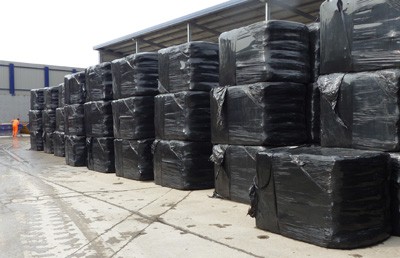With news on: Welsh RDF warning; Merseyside planning appliction; litter proposals dismissed, and student bedding partnership.
Welsh regulator in RDF permit warning
Natural Resources Wales (NRW) is asking farmers and landowners to be aware of requests to store refuse derived fuel (RDF) illegally on their land.
The warning follows an alleged increase in reports to NRW from landowners who have been approached in recent weeks, the organisation said.

NRW has warned landowners over the storage of RDF
Individuals acting alone, or operating under a company name, are offering landowners money to store large quantities of RDF, claiming it is a temporary measure before the waste is sent for incineration, according to NRW.
The agency is also reminding landowners that a permit is required in order to store the waste legally.
Geraint Richards, waste advisor at Natural Resources Wales, said: “We want to warn farmers and landowners that this underhand activity is on the rise both to protect their interests and the environment.
“While it may seem like a tempting proposition to make some extra cash, landowners could find themselves risking enforcement action, or substantial clean-up costs if the waste is abandoned by the perpetrators.
“Anyone approached to store RDF or any other waste type on their land should report it to us immediately so we can investigate further.”
_________________________________________________________________________________________
Planning permission granted for Iona-funded Southport facility
Planning consent has been awarded for a waste site incorporating anaerobic digestion, a biomass boiler and a waste transfer station in Southport, Merseyside.
The £30 million facility, which is being funded by Iona Capital, will have a combined capacity of 162,000 tonnes of non-hazardous municipal waste and inert waste per year. Liverpool-based architects Condy Lofthouse had steered the proposals through the planning process, which was approved by Sefton council.

An artist’s impression of the Southport facility
Construction on-site commences in the first week of November under the aegis of specialist Newcastle-based contractor Surgo. The plant is expected to be completed in 2017.
Commenting on the planning process, Andy Armstong of Condy Lofthouse, said: “This is the most modern facility of its type in the region and the way it utilises and processes different waste sources makes it one of the most environmentally efficient, too.
“The facility will turn commingled municipal waste into energy as well using green waste, food waste and residual waste. It’s a ground-breaking investment and is part of the country’s move towards district power generation and storage. Within five years facilities like this will be much more common and our energy mix more stable as a result.”
_________________________________________________________________________________________
Packaging producers dismiss litter funding plea
The Foodservice Packaging Association (FPA) has dismissed proposals by the Environmental Services Association (ESA) to make businesses responsible for the cost of dealing with litter.
The call came from the ESA last week, after it had claimed that the estimated £300 million in litter clean-up costs incurred by councils each year could be handed back to producers of products such as cigarettes, gum or fast food through an ‘extended producer responsibility’ regime.

ESA had proposed making producers of fast food pay a proportion of the cost of litter disposal
However, responding to the comments, Martin Kersh, executive director of the FPA said that doing so would be ‘utterly illogical’ and shift the blame away from those who drop litter.
He said: “The ESA proposal makes scant reference to changing the behaviour of those who litter and makes no reference to specific actions that will deter those in the public who drop litter from littering in the first place. Did the ESA give considerations to actions such as increasing the fines and enforcement of those who litter?”
Mr Kersh added: “In saving local authorities money by making business pay, is the ESA proposing reducing the budgets of councils by a similar amount? Will that result in a reduction of business rates or is the proposal that businesses potentially pay twice?”
_________________________________________________________________________________________
Student bedding recycled from St Andrews
The Furniture Recycling Group (TFR Group) has partnered with the University of St Andrews to recycle textiles left behind in student halls of residence.
Since partnering with TFR Group over 2,000 mattresses, duvets and pillows have been donated for recycling and reuse by the University of St Andrews’ student body.

Andrew Melville Hall of Residence, St Andrews
Each of the university’s halls of residence converted student games rooms into a donation point at the end of term and encouraged students to drop off their unwanted bedding, including duvets, mattresses and pillows.
This bedding was then recycled by TFR Group and passed to sister company R&R Beds which uses the materials to manufacture and fill new mattresses.
University of St Andrews environment officer, Barbara Aitken, said: “Disposing of such large volumes of bedding was not previously possible through the university’s existing charitable partnerships. This meant 6.2 tonnes of material was sent to landfill, despite our students expressing a preference to donate the bedding to good causes.”
Nick Oettinger, managing director at TFR Group, said: “Working with the University of St Andrews on the new circular economy initiative has been a great success, and we are proud to have been able to enhance its sustainability results while meeting the needs of its environmentally-conscious student body.
“We’re always looking for ways to partner with new industries and institutions and we hope to work with more universities and colleges to develop environmentally sustainable solutions for the disposal and reuse of bedding.”
The post News in brief (17/10/2016) appeared first on letsrecycle.com.
Source: letsrecycle.com General


